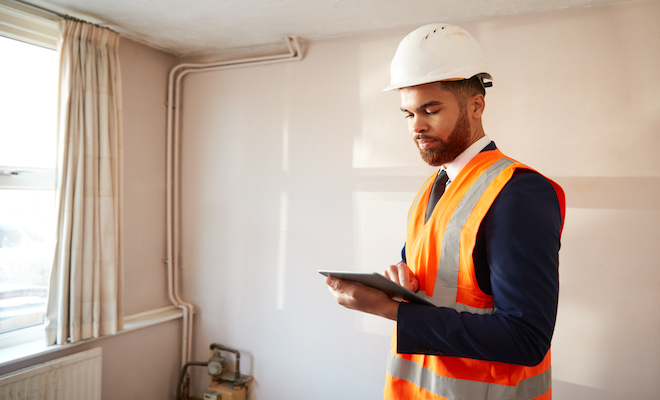House Surveyor Cost
Last updated 11th June, 2025
In need of a house surveyor?
If you need to hire a surveyor, check out this ultimate guide that will help you discover how much you need to budget for. We break down different types of house surveys and surveyors costs.
For more info - read below!

Table of Contents
- How Much Does A Surveyor Cost?
- Surveyor hourly rate cost
- Surveyor daily rate cost
- Residential property surveyor
- Valuation surveyor
- Commercial surveyor
- Dispute resolution surveyor
- Building surveyors
- Additional costs
- Surveyor qualifications
- Surveyor insurance
- How to find and hire a surveyor you can trust
- FAQs
- Sources
How Much Does a Surveyor Cost?
A house survey is an expert evaluation of a property's condition that alerts a potential buyer to any issues. A surveyor visits the site, conducts an inspection, and provides a report explaining any issues discovered. Following the acceptance of their offer by the seller, homebuyers have a survey performed on the property.
It's critical to understand what you're getting for your money, as well as the typical price. It's a good idea to shop around for services to ensure you're receiving the greatest value. The cost is determined by the type of survey and the size of the property. The longer the surveyor spends analysing the home and the more detailed the report is, the more time the surveyor will need to spend.

Surveyor Prices
The average cost of a house survey should be in the range of £350 to £400. However, there are other aspects to consider, including the various sorts of surveyor jobs, the hourly and daily rate, the qualifications and insurances required for someone to complete a surveyor for your property, and how to locate and choose a surveyor who will finish the job effectively.
There is no such thing as a one-size-fits-all career in surveying. Surveyors can work in a variety of specialities and areas of expertise. These include everything from looking at art and antiques to reconsidering urban environments.
This short guide will offer you a fast introduction to several speciality fields, whether you're thinking of retraining in a certain surveying area or just want to learn more about the different types of surveying.
Surveyor Hourly Rate Cost
The majority of Chartered Surveyors cost around £100 per hour. The cost of a survey is therefore related to the number of hours required to produce an accurate appraisal of the property. In truth, the most detailed on-site building surveys will take half a day, with a further half-day devoted to preparing a report and additional comments.
The cost of a surveyor is affected by a variety of factors.
- Complexity of the propery and the time required
- Extent of the details being requested for the job
- The level of expertise needed to carry out the evaluation
- Surveyor's professional responsibility and any legal liability
How long it will take a surveyor to complete their initial analysis will also depend on the size of the property, along with its age and condition and (to a lesser extent) the agreed purchase price.
The surveyor costs can also change depending on the location of the building as for example, a surveyor is often more expensive in the South than in the North. This is because properties in certain areas are more expensive to buy.
Below is a table of the average surveyor prices per hour in different areas of the UK.
| Location | Cost Per Hour |
|---|---|
| North-east | £90-£150 |
| North-west | £110-£150 |
| South-east | £200-£300 |
| South-west | £300-£450 |
Surveyor Daily Rate Cost
The cost also depends on the type of survey needed, as this is usually a starting point for determining the daily rate of the surveyor.
Level One: RICS Condition Report
This is the simplest form of survey, with a cost usually around £400-£950. The survey will help identify any serious defects needing immediate attention or issues that could potentially compromise the property's safety.
Other points to note about an RICS Condition Report are:
- Offers a high-level assessment of the property's condition
- Highlights major issues, albeit without going into detail
- Suitable for conventional, modern properties in good condition
- Ideal for buyers wanting reassurance that everything appears to be in working order.
- Uses a traffic light system to depict the state of various portions of the property
Alternatively, you may choose to opt for a RICS Homebuyer Report.
Level Two: RICS Homebuyer Report
This is the most common sort of survey, usually taking 2 to 4 hour to complete and costing between £450 and £1000, depending on the size of the house and is the preferred method for most properties in good condition.
A Homebuyer Report includes everything that a Condition Report does, plus a few extra points:
- Identifies issues that could impact the property's value
- Provides recommendations for repairs and ongoing maintenance
- Highlights issues such as dampness, subsidence or anything not complient with current construction codes
- Survey is non-intrusive, so only surface-level faults are identified
It may also include the surveyor’s opinion on the property's market value or even how much it would cost to completely rebuild the property if it is damaged beyond repair.
Level Three: RICS Building Survey
This the most comprehensive survey available, sometimes known as a full structural survey. The price of which can range from £450 to £1100, depending on the size, location and type of property (as outlined below).
Additional things to note about an RICS Building Survey are as follow:
- Surveyor valuates the structure and condition of the property
- The hands-on inspection includes checking the loft space and under floorboards
- Ideal for buildings over 50 years old, in poor condition or featuring unusual designs
- Recommended where large renovations are planned or if there are serious concerns about the property
- End report details any flaws, along with recommendations for repairs and maintenance.
You can also request that the surveyor include estimated prices and timelines for any proposed repairs in the report.
Here are the average surveyor costs for an RICS Building Survey broken down by region:
| Location | Cost |
|---|---|
| North-west | £450-£600 |
| North-east | £500-£7500 |
| South-west | £600-£900 |
| South-east | £700-£1100 |
Residential Property Surveyor
Residential property surveying is one type of surveying that most people are familiar with, as it supports a large section of the UK economy. Residential property surveyors' responsibilities include conducting surveys of residential structures on behalf of homebuyers before they complete their acquisition.
In addition, residential property surveyors can assist with:
- Evaluating the economic and environmental consequences of significant housing developments, as well as visiting construction sites
- Assist tenants and landlords in negotiating concerns such as rent and health and safety standards.
- Assist customers in managing their property portfolios and advising them on their contractual duties.
Valuation Surveyor
Valuation surveyors operate in a variety of fields and portfolios. They should have a lot of experience and knowledge when determining the value of residential, commercial, and industrial properties.

Valuation surveyors assess the variables of an account or project, as well as market trends, to arrive at a final valuation, whether it's for a house or a sports stadium. Valuation surveyors will advise landlords, tenants, or homebuyers based on this information and assist them with the legal and surveying processes.
Commercial Surveyor
Commercial surveyors provide advice on the state of commercial buildings and help throughout the development or construction of commercial projects. Commercial property surveyors, as experts in the field, can:
- Conduct surveys of existing commercial properties and assist customers with lease or purchase decisions.
- Whether it's providing information on planning and regulations, or on-site inspections and assistance, we help clients manage their commercial development projects.
- Guide topics such as sustainability, energy efficiency, and health and safety in commercial buildings.
Dispute Resolution Surveyor
Dispute resolution surveyors can function as mediators or arbitrators to help resolve disputes in the property, land, and construction sectors, whether it's a dispute over contracts, boundaries, or planning.

Dispute resolution surveyors can act as expert witnesses in particular tribunals or as independent experts in certain procedures and play a crucial role during the mediation of disputes in land, property, or construction.
Building Surveyors
One of the most diverse fields of surveying is this. Building surveyors work on various projects and guide anything from design and construction to renovation and restoration of existing structures.
Building surveyors are experts in a variety of fields, including:
- Report on the quality of various types of buildings and make recommendations for how to improve them.
- Assist architects in developing plans and estimates for new projects, as well as overseeing budgets and work during construction.
In areas such as valuation, purchasing, and health and safety, provide legal and regulatory guidance.
Additional Costs
While surveyor prices are by the hour or day, there are other factors to consider that may affect the overall cost.
Urgency Fees
If you require a quick turnaround, some surveyors will offer a priority service for an additional fee, typically ranging from an additional £100 to £250, to complete surveys and provide reports quicker.
Post-Survey Consultation
If you have any additional queries, or points you wish to discuss once the survey is completed, it is possible to book a follow-up appointment. These are typically charged at an hourly rate, on average ranging from £150 to £180 per hour.
Third Party Services
If your surveyor needs to access third party services, such as obtaining documents from the Land Registry or conducting environmental searches, these are normally an additional cost factor of anything from £10 to £300.
Specialist Surveys or Reports
For properties with a unique condition you may require a specialist service such as a subsidence, drainage or asbestos survey. Depending on the complexity these can range from £250 to £1000.
Structural Survey
For properties with significant structural concerns, a more in-depth survey may be required, costing £500 to £1500 or over, depending on the size and location of the property.
Surveyor Qualifications
Building surveying encompasses a wide range of activities and responsibilities, therefore having the appropriate training and certifications is critical.
Although no formal qualifications are legally required to call yourself a surveyor, a chartered surveyor will be registered and regulated by the Royal Institution of Chartered Surveyors (RICS).
To become completely qualified, most building surveyors must undergo two years of organised, professional experience.
The Assessment of Professional Competence (APC) is a fully supervised and structured training programme, designed to ensure that all trainee surveyors are competent to practise and adhere to the RICS's standards.
Trainee surveyors can also apply for an RICS-accredited degree training programme, in order to receive a certificate confirming they have met the requirements of the RIC.

Surveyor Insurance
Surveyors who take exact measurements to identify property borders and update boundary lines should carry professional and general liability insurance.
When working with clients who object to or are adversely harmed by a surveyor's services, a variety of challenges might arise. Getting business insurance ensures full protection and allows surveyors to provide a valuable service to clients.
There are two primary types of insurance coverage for most land surveyors:
- Professional Liability Insurance - Protects land surveyors and homeowners against negligence, personal injury and legal costs, although it doesn’t udually cover fraud or property damage.
- General Liability Insurance - Often known as a commercial general liability (CGL), protects land surveyors and property owners from property damage, bodily harm claims, and medical expenses.

How to Find and Hire a Surveyor You Can Trust
Organising a survey can be one of the most stressful parts of the home-buying process. To help reduce stress and ensure you get a thorough report, here are some steps to find and hire a reliable surveyor:
- Personal recommendation is the best way to find a trustworthy surveyor.
- The Royal Institution of Chartered Surveyors (RICS) is the UK’s largest professional body of surveyors.
- Utilise the RICS website's surveyor-finder.
- Look for surveyors with ARICS, FRICS, or TechRICS after their name to identify accredited professionals.
- Many reputable surveyors also have ISO 9002 accreditation, proving they meet an independent quality control standard.
Another typical option to obtain a homebuyer's report is to request one from the lender's surveyor at the time of the valuation.
Although chartered surveyors have a duty of care to their clients and are required by law to tell you what they uncover, some buyers believe surveyors suggested by estate agents are less scrutinising.
It's important to avoid any potential conflicts of interest. If the estate agent is acting on behalf of the buyer, not including them in your surveyor selection could be preferable.
Once you've identified a surveyor, you should do everything you can to ensure that you get exactly what you want out of the examination, rather than a usual 10-to-20-page property report. Pick up the phone and speak with your surveyor about any concerns that are bothering you.
How to know if you have chosen the right surveyor
It's a difficult job, and it must be done correctly to avoid any issues once development work, excavations, or other procedures begin on site.
- Communication is crucial for a surveyor. Excellent communication skills are essential in any situation, whether chatting with clients or writing a clear and succinct report.
- The specific qualifications you want may likely vary depending on the project you're working on. Still, in general, a well-trained and experienced surveyor is more likely to have dealt with the issues your project will face in the past.
- It's always vital to have the right tools for the work, but it's especially important for a land surveyor because properly calibrated equipment can have a direct and considerable impact on the accuracy of measurements and drawings.
FAQs
If you require a valuation on a future or current renovation project, you'll need the help of a chartered surveyor. A surveyor can assess the value of land, machines, and structures, and they usually specialise in one of these areas.
Sources
https://www.ricsrecruit.com/article/summary-of-the-surveying-specialisms
https://www.simonlevy.net/what-qualifications-do-you-need-to-be-a-building-surveyor
https://www.hiscox.com/small-business-insurance/professional-business-insurance/land-surveyor-insurance
https://www.theguardian.com/money/2005/sep/22/movinghouse.property










